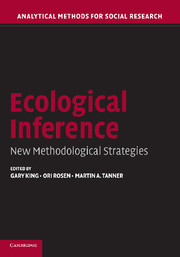Book contents
- Frontmatter
- Contents
- Contributors
- Preface
- INTRODUCTION
- PART ONE
- PART TWO
- 4 Extending King's Ecological Inference Model to Multiple Elections Using Markov Chain Monte Carlo
- 5 Ecological Regression and Ecological Inference
- 6 Using Prior Information to Aid Ecological Inference: A Bayesian Approach
- 7 An Information Theoretic Approach to Ecological Estimation and Inference
- 8 Ecological Panel Inference from Repeated Cross Sections
- PART THREE
- PART FOUR
- Index
6 - Using Prior Information to Aid Ecological Inference: A Bayesian Approach
Published online by Cambridge University Press: 18 May 2010
- Frontmatter
- Contents
- Contributors
- Preface
- INTRODUCTION
- PART ONE
- PART TWO
- 4 Extending King's Ecological Inference Model to Multiple Elections Using Markov Chain Monte Carlo
- 5 Ecological Regression and Ecological Inference
- 6 Using Prior Information to Aid Ecological Inference: A Bayesian Approach
- 7 An Information Theoretic Approach to Ecological Estimation and Inference
- 8 Ecological Panel Inference from Repeated Cross Sections
- PART THREE
- PART FOUR
- Index
Summary
ABSTRACT
This research concerns a long-standing historical question: How did previously disenfranchised women employ the ballot after suffrage extension in the United States? The absence of reliable survey data from the 1920s and the ecological fallacy have frustrated efforts to learn about the voting behavior of women in this period. The ecological inference problem is particularly difficult in the case of sex differences. In contrast to many other politically interesting groups (e.g., racial and ethnic minorities), women are generally not characterized by particular residential patterns; as a result, there is minimal variation in the percent female across units. We address this challenge, and the ecological inference problem generally, by (1) introducing new, highly disaggregated election returns and census data; (2) adding nonsample information from the historical context to inform our estimates (specifically, the previous electoral behavior of men and the easily defensible assumption that male turnout exceeds female turnout); and (3) taking advantage of the existence of one state, Illinois, where male and female ballots were tabulated separately in 1916 and 1920. We adopt and investigate the performance of a hierarchical binomial–normal model developed by Wakefield (2001). The results suggest that, while estimates can be highly contingent on investigator assumptions, a hierarchical strategy coupled with a limited number of uncontroversial assumptions can generate plausible estimates of turnout by gender.
- Type
- Chapter
- Information
- Ecological InferenceNew Methodological Strategies, pp. 144 - 161Publisher: Cambridge University PressPrint publication year: 2004
- 1
- Cited by



